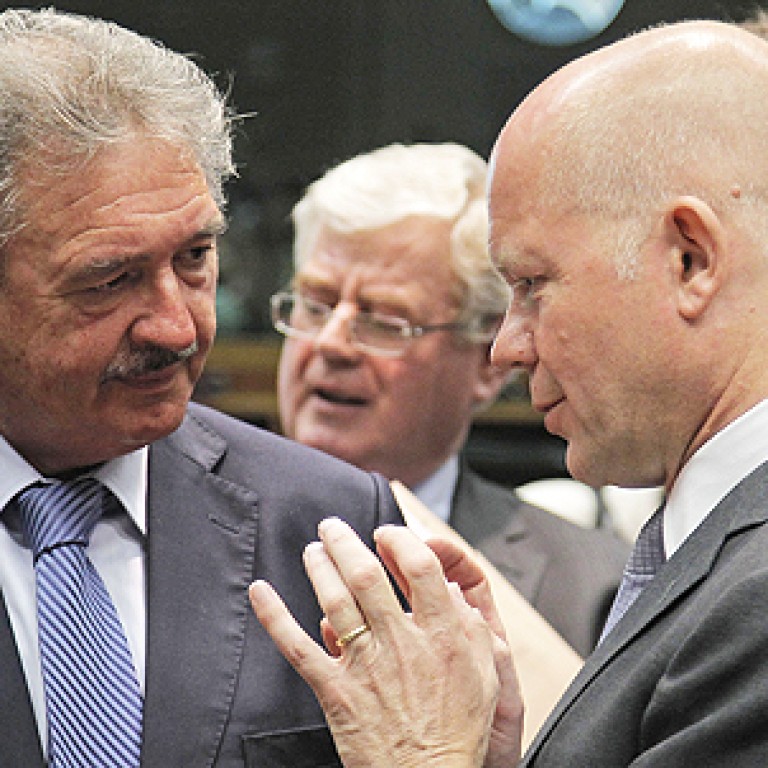
European Union puts Hezbollah military wing on terror list
EU foreign ministers agreed on Monday to blacklist Hezbollah’s armed wing, holding it responsible for attacks in Europe, as ministers overcame reservations in some member states that such a move would further destabilise Lebanon where the militant group plays a major role.
EU foreign ministers agreed on Monday to blacklist Hezbollah’s armed wing, holding it responsible for attacks in Europe.
“Agreement reached to list Hezbollah,” an EU diplomat said, as ministers overcame reservations in some member states that such a move would further destabilise Lebanon where the militant group plays a major role.
To do so, ministers agreed that EU political and economic links with Lebanon would be maintained.
They also highlighted the fact that it is the military wing alone that is blacklisted after Hezbollah was blamed for a deadly attack on Israeli tourists in Bulgaria last year.
“It is good that the EU has decided to call Hezbollah what it is: a terrorist organisation,” Dutch Foreign Minister Frans Timmermans said.
It is good that the EU has decided to call Hezbollah what it is: a terrorist organisation
“For years the Netherlands has pushed for listing Hezbollah,” he said. “That’s why I’m satisfied that we took this important step today, by dealing with the military wing of Hezbollah, freezing its assets, hindering its fundraising and thereby limiting its capacity to act.”
A draft of the meeting conclusions noted that making use of “restrictive measures to combat terrorism does not prevent the continuation of dialogue with all political parties in Lebanon.”
“Legitimate financial transfers” and aid will also not be affected, it added.
On Thursday, Lebanon asked Brussels not to blacklist Hezbollah on the grounds the militant group was an “essential component of Lebanese society”.
Hezbollah, which is close to Iran, is Israel’s sworn enemy, and its recent intervention in Syria has dismayed Western powers which back rebels battling to oust President Bashar al-Assad.
A decision to put the militia on the European Union list of terrorist groups required approval by all 28 national ministers.
Britain pressed hard for the decision, saying it was a “high priority”. “It is very important that when there is a terror attack on European soil there needs to be a reaction,” British Foreign Secretary William Hague said as he arrived for the talks early Monday.
Hague said he did not believe that blacklisting Hezbollah “would destabilise Lebanon,” adding: “It is important to show that we are united in face of terrorism.”
It is important to show that we are united in face of terrorism
German Foreign Minister Guido Westerwelle agreed. “We cannot allow the military wing of Hezbollah to carry out terrorist activities in EU ... we think we have to answer such activities ... and the answer is to blacklist them.”
Arriving for the talks, ministers had also highlighted the possible resumption of stalled Israel-Palestinian talks after a major push by US Secretary of State John Kerry and the need to promote democracy in Egypt after the military ouster of the elected government.
EU foreign affairs head Catherine Ashton said the Middle East Peace Process and Egypt would be key issues.
“We will be looking to make sure that Egypt gets back on the path to democracy,” she said, stressing that “this is about democracy, making sure that that happens.”
Hague and other ministers deplored the deterioration in Syria where President Assad has made inroads against the rebels who are torn by bloody infighting and growing extremism, prompting concerns they will lose the war.
At their last meeting in May, ministers led by Britain and France agreed to end the EU arms embargo on Syria so as to allow supplies to the rebels but not before August 1 as Washington and Moscow negotiated for a fresh peace conference in Geneva.
With the Geneva prospect faltering, and Russia discussing extending a loan to Damascus, according to a top Syrian official, Ashton was also due to give an overall update on the situation in there.
Syria “may not be top of the headlines but the situation there is terrible,” Ashton said, adding: “The sooner the political process to end this begins, the sooner people will live in safety.”
